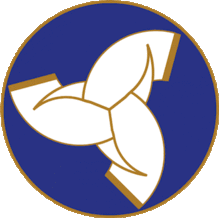Asatru Folk Assembly
| Part of a series on |
| Heathenry |
|---|
 |
| Historical Germanic religion |
|
Theory |
|
Organisation
Religious institutions: |

The Asatru Folk Assembly (AFA) is a US-headquartered, but international folkish[3] Ásatrú organization, with chapters worldwide, founded by Stephen A. McNallen in 1994. The AFA is recognized as a 501(c)(3) non-profit religious organization, or church[4][5] and is headquartered in Grass Valley, California.[6][7][8]
In 2018, the Southern Poverty Law Center added Asatru Folk Assembly to its list of hate groups, describing it as a "Neo-Volkisch hate group"[9]
History
Early roots of the organization can be found in the Viking Brotherhood which was founded by McNallen in 1972. McNallen was one of the earliest advocates of reconstructing Germanic Paganism in modern times. The Viking Brotherhood later evolved into the Asatru Free Assembly in 1974, and was disbanded in 1986, splitting into two successor organizations, the "folkish" Ásatrú Alliance, and the "universalist" the Troth.[10] In 1986 the Asatru Free Assembly ceased operations, due to burnout and disputes within the membership.
According to accounts by McNallen, it was not due to racial politics, but because administration was time-consuming and a request seeking pay for religious work was rejected by the membership. The organization was ultimately disbanded.[11]
McNallen founded the Asatru Folk Assembly in 1995 as the successor organization to the Asatru Free Assembly. The defunct Asatru Free Assembly is sometimes distinguished from the newer Asatru Folk Assembly by the usage of "old AFA" and "new AFA", respectively. From 1997-2002, the AFA was a member organization of the International Asatru-Odinic Alliance.
McNallen believes in an "integral link between ancestry and religion, between biology and spirituality," and according to Jeffrey Kaplan the organization was founded in part to counteract rumored "universalist" tendencies he discerned in Ring of Troth.[12]
In 1999, the assembly almost acquired land in northern California, aiming to base a communal project with room for agriculture and religious worship.[7] However, the organization never held legal title to the land. Upon promises that the subject piece of land would be donated, some members of the AFA built a simple hof there, after which the actual owner of the land chose not to donate it.
In the late 1990s, the assembly got involved with the protracted fight over the remains of the Kennewick Man: they claimed that these were the remains of a European ancestor and were allowed to approach, but not touch, the coffin holding him.[13] Later testing found that the Kennewick Man was genetically similar to Native Americans and Ainu people.
In May 2017, Facebook deleted the AFA's primary social media outlet citing hate speech as the reason.[14] In 2018, the Southern Poverty Law Center added Asatru Folk Assembly to its list of hate groups as part of a new category called "Neo-Volkisch."[15]
Activity
Since 2013, the AFA has owned rights to many of Edred Thorsson's books.[16]
In August 2015 the AFA acquired a former Grange Hall in Brownsville, California, built in 1938, to be used as a hof and community center under the name Newgrange Hall Asatru Hof.[17][18][19] It was previously the Youth Center of the Mountaintop Christian Academy of CA,[20][21] and at another time the Marge Moore Youth Center.[19][22]
References
- Notes
- ↑ "Asatru Folk Assembly - The Asatru Folk Assembly's Symbol". 9 July 2011. Archived from the original on 9 July 2011. Retrieved 12 December 2017.
- ↑ Archived 2015-09-23 at the Wayback Machine.
- ↑ Gardell 152, 261.
- ↑ "AFA - Member Services". Member.asatrufolkassembly.org. Retrieved 12 December 2017.
- ↑ "Asatru Folk Assembly - 501C3 Nonprofit - Nevada City, CA - 680386731". Taxexemptworld.com. Retrieved 12 December 2017.
- ↑ "Obituaries, Death Notices and Memorials for Nevada City and Grass Valley California". Theunion.com. Retrieved 12 December 2017.
- 1 2 Gardell 261
- ↑ Archived 2015-09-23 at the Wayback Machine.
- ↑ SPLC. "Neo-Volkisch". Online. Accessed 6 August 2018
- ↑ Strmiska, Michael (2005). Modern paganism in world cultures: comparative perspectives. ABC-CLIO. p. 133. ISBN 978-1-85109-608-4. Retrieved 30 January 2012.
- ↑ Stephen A. McNallen, "Three Decades of the Ásatrú Revival in America", in Joshua Buckley & Michael Moynihan (eds.), TYR: Myth - Culture - Tradition, Volume 2 (Atlanta: Ultra, 2003-2004), p. 208-9.
- ↑ Kaplan, Jeffrey (1997). Radical religion in America: millenarian movements from the far right to the children of Noah. Syracuse UP. pp. 31–32. ISBN 978-0-8156-0396-2. Retrieved 30 January 2012.
- ↑ Bay-Hansen, C. D. (2002). Futurefish 2001: Futurefish in Century 21: The North Pacific Fisheries Tackle Asian Markets, the Can-Am Salmon Treaty, and Micronesian Seas, 1997-2001. Trafford. p. 214. ISBN 978-1-55369-293-5. Retrieved 30 January 2012.
- ↑ "Pagan Community Notes: Nathan Smith, AFA, Niagara Cannabis Club, and more". The Wild Hunt. 22 May 2017. Retrieved 22 November 2017.
- ↑ https://www.splcenter.org/fighting-hate/extremist-files/ideology/neo-volkisch, accessed 6 Aug 2018
- ↑ Archived 2015-09-23 at the Wayback Machine.
- ↑ "Newgrange Hall - Asatru Hof". The Crowdfunding Center. Retrieved 12 December 2017.
- ↑ "NewGrange Hall - Asatru Hof". Indiegogo. Retrieved 12 December 2017.
- 1 2
- ↑ "Google Maps". Google Maps. Retrieved 12 December 2017.
- ↑ Archived 2016-03-04 at the Wayback Machine.
- ↑ Archived 2016-09-16 at the Wayback Machine.
- Bibliography
- Gardell, Mattias (2003). Gods of the blood: the pagan revival and white separatism. Duke UP. ISBN 978-0-8223-3071-4. Retrieved 30 January 2012.